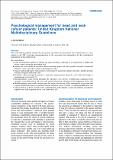Files in this item
Psychological management for head and neck cancer patients : United Kingdom National Multidisciplinary Guidelines
Item metadata
| dc.contributor.author | Humphris, G. | |
| dc.date.accessioned | 2016-08-30T16:30:09Z | |
| dc.date.available | 2016-08-30T16:30:09Z | |
| dc.date.issued | 2016-05-12 | |
| dc.identifier | 245443898 | |
| dc.identifier | f58c5123-570a-44b2-b049-9df0e9c68e71 | |
| dc.identifier | 000379853600009 | |
| dc.identifier | 85021852230 | |
| dc.identifier | 000379853600009 | |
| dc.identifier.citation | Humphris , G 2016 , ' Psychological management for head and neck cancer patients : United Kingdom National Multidisciplinary Guidelines ' , The Journal of Laryngology and Otology , vol. 130 , no. Suppl, S2 , pp. S45-S48 . https://doi.org/10.1017/S0022215116000426 | en |
| dc.identifier.issn | 0022-2151 | |
| dc.identifier.other | ORCID: /0000-0002-4601-8834/work/64033903 | |
| dc.identifier.uri | https://hdl.handle.net/10023/9400 | |
| dc.description.abstract | This is the official guideline endorsed by the specialty associations involved in the care of head and neck cancer patients in the UK. It provides recommendations on the assessment and interventions for the psychological management in this patient group. Recommendations • Audit of information supplied to patients and carers should be conducted on an annual basis to update and review content and media presentation. (G) • Patients and carers should be invited to discuss treatment options and relate possible outcomes to functional retention or loss to provide a patient-centred approach. (G) • Clinical staff should inspect their systems of assessment to make them sensitive enough to identify patients with psychological difficulties. (G) • Flexibility, rather than rigid formulation is required to assess patients frequently, and to allow for change in circumstances to be noted. (G) • Multidisciplinary teams should determine the supportive care services available and commission extra assistance to provide patients and carers with timely information, education or brief supportive advice. (G) • Multidisciplinary teams need to inspect specialist services for mental health interventions at structured and complex levels for the small proportion of patients with more serious, but rarer, psychological difficulties. (G) • Clinical staff at all levels should receive communication skills training to raise and maintain consultation expertise with difficult patient and/or carer interactions. (G) | |
| dc.format.extent | 4 | |
| dc.format.extent | 55336 | |
| dc.language.iso | eng | |
| dc.relation.ispartof | The Journal of Laryngology and Otology | en |
| dc.subject | RF Otorhinolaryngology | en |
| dc.subject | NDAS | en |
| dc.subject | SDG 3 - Good Health and Well-being | en |
| dc.subject.lcc | RF | en |
| dc.title | Psychological management for head and neck cancer patients : United Kingdom National Multidisciplinary Guidelines | en |
| dc.type | Journal article | en |
| dc.contributor.institution | University of St Andrews. School of Medicine | en |
| dc.contributor.institution | University of St Andrews. WHO Collaborating Centre for International Child & Adolescent Health Policy | en |
| dc.contributor.institution | University of St Andrews. Health Psychology | en |
| dc.contributor.institution | University of St Andrews. St Andrews Sustainability Institute | en |
| dc.identifier.doi | https://doi.org/10.1017/S0022215116000426 | |
| dc.description.status | Peer reviewed | en |
This item appears in the following Collection(s)
Items in the St Andrews Research Repository are protected by copyright, with all rights reserved, unless otherwise indicated.

